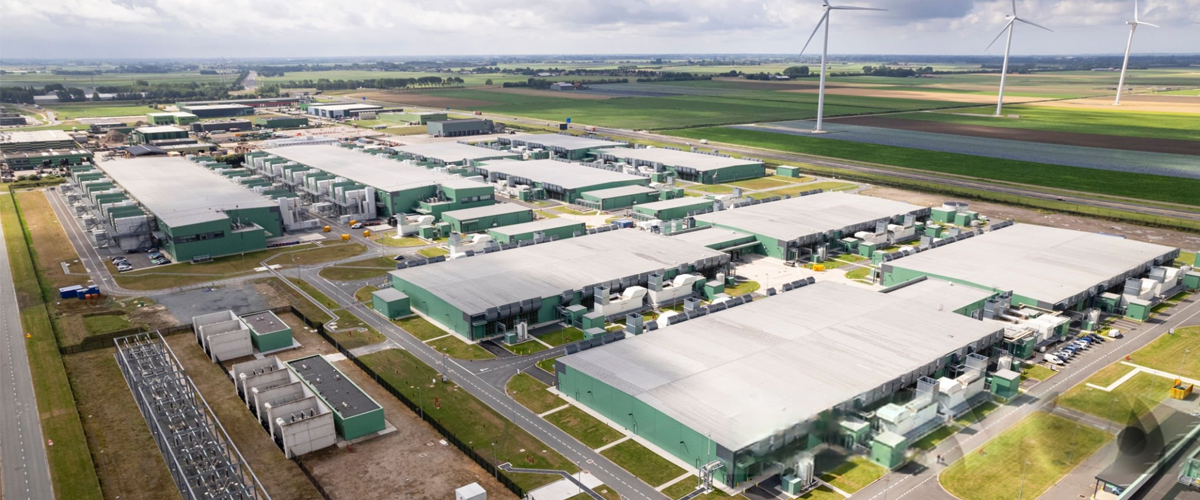

The explosion of big data, encompassing everything from consumer behaviour to financial transactions to health records, requires substantial storage, computing power, and processing speed. All this data is stored and processed in data centers, enabling insights and analytics that drive business decisions, predictive models, and innovations. This blog explores the latest trends and technologies that define the future of data centers, which include Artificial Intelligence (AI) and the increasing usage of data centers.

AI-Powered Data Centers
Artificial intelligence is revolutionising the way data centers operate. As AI continues to evolve, the demand for data centers that can handle heavy processing and storage needs increases. AI-driven automation and analytics are enhancing operational efficiency, reducing downtime, and optimising resource allocation. Meta’s AIOps platform, for example, predicts hardware failures with 92% accuracy and cuts downtime by 65%.
What makes modular data centers the driving force in technological innovation for industries across the globe? Let’s find out. Unlike traditional data centers, which are typically large, static facilities built in a fixed location, modular data centers consist of self-contained, standardised units that can be quickly deployed, expanded, and customised based on need. One such need is the flexibility and scalability of data center designs offered by modular data centers. Microsoft’s Azure Modular Data Center (AMDC) program enables rapid deployment and scalability, which results in reduced deployment costs. Their ability to support liquid immersion cooling for high-density GPUs and achieve high heat capture efficiency affects energy savings significantly.
Cloud services such as Amazon Web Services (AWS), Microsoft Azure, and Google Cloud have significantly led to an increase in demand for data centers. These services allow companies to store and process data remotely rather than relying on on-site servers. By integrating on-premises and cloud GPU resources, hybrid environments allow for dynamic resource allocation and energy optimisation. With 48% of IT leaders prioritising hybrid environments, hybrid cloud models are becoming increasingly popular as businesses seek to balance flexibility, security, and performance. Safe to say that the demand for scalable, secure, and reliable storage continues to grow as businesses move more operations to the cloud.
As AI is playing an important role in securing data and infrastructure, let’s take a look at how AI-driven cybersecurity solutions are closely related to data centers. Data centers are prime targets for cyberattacks because they store vast amounts of sensitive information and are critical to the functioning of organisations’ IT operations. To safeguard these valuable resources, AI-driven cybersecurity solutions are integrated into data center environments to enhance security and protect against evolving threats. In data centers, large volumes of traffic are processed constantly, which makes it difficult for traditional security systems to identify malicious activities. The AI-driven cybersecurity systems can reduce response times by up to 90% compared to manual processes, providing a critical layer of protection.
In India, the increasing use of technologies like 5G, the Internet of Things (IoT), and the shift towards cloud computing has led to the rapid rise of edge data centers. Edge data centers are smaller, distributed data facilities located closer to the end users and devices, enabling faster data processing, lower latency, and more efficient use of resources. The Indian government’s initiatives to promote smart city projects have further accelerated the demand for edge computing. With significant investments being made in both infrastructure and technology, edge data centers are expected to play a pivotal role in India’s digital transformation in the coming years.
Sustainability and energy efficiency are central to the future of modern data centers. As the demand for digital services continues to grow, data centers must adopt innovative strategies and technologies to reduce their environmental impact while maintaining performance and reliability. From renewable energy adoption and efficient cooling to AI-driven optimisation and smart infrastructure, data centers are transforming into more sustainable, energy-efficient facilities. This is not only essential for meeting regulatory requirements but also for reducing operational costs, enhancing reputation, and contributing to global efforts to combat climate change.
The demand for AI-driven data centers has been increasing globally, with a notable rise in India as well. AI-driven data centers refer to facilities that leverage artificial intelligence (AI), machine learning (ML), and advanced analytics to optimise various aspects of data center operations – ranging from energy efficiency and security to workload management and predictive maintenance. According to McKinsey, the global demand for data center capacity is projected to rise at an annual rate of between 19% and 22% from 2023 to 2030, reaching an annual demand of 171 to 219 gigawatts (GW). The rapid expansion of AI workloads and data-intensive applications drives this surge. AI data centers are expected to account for 3-4% of global power demand by 2030. As India continues to embrace digital transformation, AI-driven data centers will play a crucial role in supporting this growth.
As AI adoption continues to expand across sectors like healthcare, banking, and education, the demand for AI-powered infrastructure will continue to grow. Let’s delve into the crucial components of infrastructure.
Graphics Processing Units (GPUs), Tensor Processing Units (TPUs), and AI accelerators are part of the core infrastructure that drives AI operations to process the vast amount of data.
AI workloads are dynamic and resource-intensive. They require scalability to grow and shrink based on demand and modularity to provide the flexibility to add, replace, or upgrade components with minimal disruption.
Next-generation cooling and thermal management technologies are key components in AI data centers as they offer more efficient and cost-effective ways to deal with the massive heat generation that accompanies high-performance AI workloads.
AI applications, including deep learning, machine learning, data analytics, and real-time decision-making, generate and consume massive amounts of data, as big as petabytes per second. This makes high-speed networking and connectivity the foundational elements for ensuring efficiency, speed, and scalability.
AI data centers are turning to renewable energy sources such as solar, wind, and hydropower to reduce their environmental impact. Integrating these energy sources not only helps reduce reliance on non-renewable grids but also enables companies to achieve sustainability targets. The physical infrastructure of the AI data center, on the other hand, also plays a key role in reducing its overall energy consumption. Using sustainable building materials and optimising the layout of the data center can contribute to both energy efficiency and sustainability.
The future of data centers is being shaped by growing demands from emerging
technologies like AI, IoT, and 5G. As more businesses embrace digital
transformation, the need for high-performance computing and robust
infrastructure continues to rise. AI and machine learning are pushing the
limits of traditional data centers, requiring faster, more energy-efficient
hardware and advanced cooling systems. To stay ahead of the curve,
businesses must prioritise scalability, sustainability, and efficiency in
their data center strategy while investing in cutting-edge technologies that
support these advancements. Staying agile and adopting innovations like
modular infrastructure and AI-driven optimisation will help businesses
future-proof their operations and manage growing data demands
effectively.
Legrand, a global specialist in electrical and digital building
infrastructures, is uniquely positioned to support the development of
AI-ready data centers. The company offers a broad portfolio of innovative
solutions, including power distribution systems, advanced cooling
technologies, and networking equipment designed to maximise the efficiency
and reliability of AI-driven data centers. Additionally, Legrand’s
high-performance networking solutions ensure low-latency connectivity and
their energy-efficient solutions reduce carbon footprints while maintaining
high performance.
The explosion of big data, encompassing everything from consumer behaviour
to financial transactions to health records, requires substantial storage,
computing power, and processing speed. All this data is stored and processed
in data centers, enabling insights and analytics that drive business
decisions, predictive models, and innovations. This blog explores the latest
trends and technologies that define the future of data centers, which
include Artificial Intelligence (AI) and the increasing usage of data
centers.

Introducing Legrand Incara: smart power, seamlessly integrated into modern workspace
READ SMART SPACEGround Floor, Plot No. 603, Khata No. 457, Beside Pinak Traders, Gutuwa, Ranchi
B-1703, The Capital, Opp. Hetarth Party Plot, Science City Road, Sola, 380060
6-3-5953, Plot No-03, Narayan Nivas, Padmavathi Nagar, Erramanzil Colony, Khairtabad, Hyderabad
Isha House, Plot No-13, Electronic Co-Op Estate Ltd., Sr. No-4, Pune-Satara Road, Parvati, Pune
New India Cables Trading Pvt. Ltd 5 B,ganesh Road Near Kasba Ganpati Temple Pune - 411011
New India Cables Trading Pvt. Ltd., 5B, Ganesh Road, Near Kasba Ganpati Temple, Pune - 411011
D.no - 49-52-116, 1st Floor, Adushatowers, Opp Incometax Office, Shantipuram,
Merril Industrial Complex Pojoynagar, Near Dhulagarh Toll Tax, Ps Sandhipur Sankrail, Howrah
Shop No. 1, Opp. Super State Colony, New Purena, Mahaveer Nagar, Raipur, Chhattisgarh
64, Jay Amarnath Co-Operative Housing Society Ltd., Near Skill Diamond Skill Mill, Nikol Gam Road
1, Mall Godam Road, Shop No 21, Vashundhara Complex, Near New Shiyaganj, Indore
7-670-1, Near Gandhi Nagar, 10th Lane, Mangamoor, Donka, Ongole, Andhra Pradesh 523002
Ground Floor,plot No-603, Khata No 457, Beside Pinak Traders Gutuwa, Ranchi


